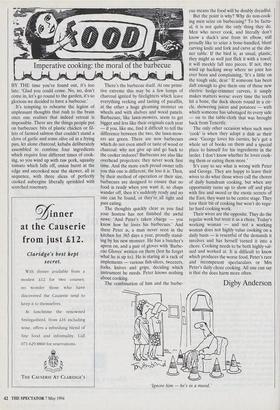Imperative cooking: the moral of the barbecue LgeL .
BY THE time you've found out, it's too late: 'Glad you could come. No, no, don't come in, let's go round to the garden, it's so glorious we decided to have a barbecue.'
It's tempting to rehearse the legion of unpleasant thoughts that rush to the brain once one realises that indeed retreat is impossible. There are the things people put on barbecues: bits of plastic chicken or fil- lets of farmed salmon that couldn't stand a clove of garlic and some olive oil in a frying pan, let alone charcoal; kebabs deliberately assembled to combine four ingredients which require four different times of cook- ing, so you wind up with raw pork, squashy tomato which falls off, onion burnt at the edge and uncooked near the skewer, all in sequence, with three slices of perfectly cooked aubergine liberally sprinkled with scorched rosemary. There's the barbecue itself. At one primi- tive extreme this may be a few lumps of charcoal ignited by firelighters which leave everything reeking and tasting of paraffin, at the other a huge gleaming monster on wheels and with shelves and wood panels. Barbecues, like lawn-mowers, seem to get bigger and less like their originals each year — if you, like me, find it difficult to tell the difference between the two, the lawn-mow- ers are green. There are now barbecues which do not even smell or taste of wood or charcoal: why not give up and go back to the cooker indoors? Barbecues are also like overhead projectors: they never work first time. And the more each proud owner tells you this one is different, the less it is. Then, by their method of operation or their size, barbecues are designed to ensure that no food is ready when, you want it, so chaps wander off, then it's' suddenly ready and no one can be found, or they're, all tight and past eating.
The thoughts quickly clear as you find your hostess has not finished the awful news: 'And Peter's taken charge — you know how he loves his barbecues.' And there Peter is, a man never seen in the kitchen for 365 days a year, proudly stand- ing by his new monster. He has a butcher's apron on, and a pair of gloves with 'Barbe- cue Gloves' written on them (lest he forget what he is up to). He is staring at a rack of implements — various fish-slices, tweezers, forks, knives and grips, deciding which instrument he needs. Peter knows nothing about cooking.
The combination of him and the barbe-
cue means the food will be doubly dreadful.
But the point is why? Why do non-cook- ing men seize on barbecuing? To be factu- al, it is not quite the only thing they do. Men who never cook, and literally don't know a duck's arse from its elbow, still proudly like to seize a bone-handled, blunt carving knife and fork and carve at the din- ner table. If the bird is, as usual, plastic, they might as well just flick it with a towel; it will meekly fall into pieces. If not, they wind up hacking away where no joint has ever been and complaining, 'It's a little on the tough side, dear.' If someone has been daft enough to give them one of those new electric hedge-trimmer carvers, it simply makes matters worse: every time the teeth hit a bone, the duck shoots round in a cir- cle, showering juices and potatoes — with which someone has sabotaged its every side — on to the table-cloth that was brought back from Tenerife.
The only other occasion when such men `cook' is when they adopt a dish as their own: 'George loves his curries, he's got a whole set of books on them and a special place to himself for his ingredients in the larder. I don't know whether he loves cook- ing them or eating them more.'
It's easy to see what is wrong with Peter and George. They are happy to leave their wives to do what those wives call the chores of daily humdrum cooking, but when any opportunity turns up to show off and play with fire and sword or the exotic secrets of the East, they want to be centre stage. They love their bit of cooking but won't do regu- lar hard cooking work.
Their wives are the opposite. They do the regular work but treat it as a chore. Today's working woman — and not a working woman does not highly value cooking on a daily basis — is resentful of the demands it involves and has herself turned it into a chore. Cooking needs to be both highly val- ued and worked at. It is difficult to know which produces the worse food, Peter's rare and incompetent spectaculars or Mrs Peter's daily chore cooking. All one can say is that she does harm more often.
Digby Anderson
'Ignore him — he's in a mood.'


















































 Previous page
Previous page